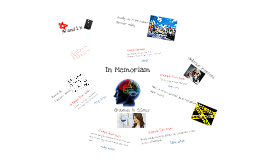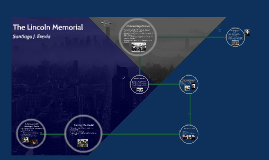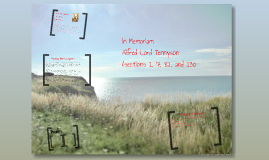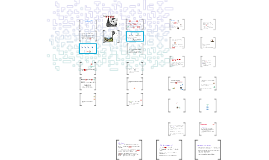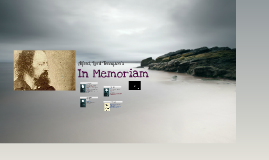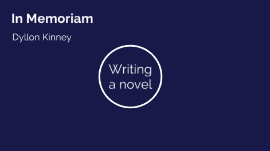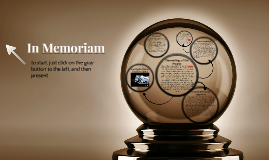In Memoriam
Transcript: In Memoriam Alfred Lord Tennyson (sections 1, 7, 82, and 130 Characteristically, throughout In Memoriam, Alfred Lord Tennyson employs the imagery of natural elements in order to portray his feelings and emotions after the death of his close friend, Arthur Henry Hallam. Perhaps the most poignant of these images is that of the wind, represented in many ways throughout the poem, and linked closely to the concept of calm despair' and wild unrest'. Abigail Iliffe Experts Say: Tennyson is one of the best known poets of the Victorian era, and indeed his stylistic features and subjects epitomize the period. In Memoriam is one of his major works, and in this elegy he mourns the death of his best friend Arthur Hallam. I shall be discussing section LV specifically; first analyzing how Tennyson structures this section then discussing how it fits in with the rest of the poem which is essentially a dedication to his best friend and an exploration of immortality, his faith, and the meaning of loss. Marianne Porter Theme: Tennyson is grieving the death of a very close friend. Unified by the poetic persona's grief, doubt, and search for faith. The composition of In Memoriam was initiated by Tennyson's deep suffering at the loss of his brilliant young friend, the promising poet and scholar Arthur Henry Hallam, who died suddenly in 1833 at the age of twenty-two. Photo based on: 'horizon' by pierreyves @ flickr Rhyme- In each stanza, the first and last line rhyme, so do the two middle lines. Of their dead selves to higher things. 7 15`Behold the man that loved and lost, Here in the long unlovely street, Ah, sweeter to be drunk with loss, That men may rise on stepping-stones 130 Thy voice is on the rolling air; I hear thee where the waters run; Thou standest in the rising sun, And in the setting thou art fair. What art thou then? I cannot guess; But tho' I seem in star and flower To feel thee some diffusive power, I do not therefore love thee less: My love involves the love before; My love is vaster passion now; Tho' mix'd with God and Nature thou, I seem to love thee more and more. Far off thou art, but ever nigh; I have thee still, and I rejoice; I prosper, circled with thy voice; I shall not lose thee tho' I die The long result of love, and boast, Or reach a hand thro' time to catch To one clear harp in divers tones, The noise of life begins again, Author Background Time period characteristics To dance with death, to beat the ground, I Let Love clasp Grief lest both be drown'd, On the bald street breaks the blank day. Imagery- part 1, stanza 1— music in Heaven Literary Devices But who shall so forecast the years So quickly, waiting for a hand, Title of Poem- A Memoriam, A.H.H. Poet- Alfred Lord Tennyson Completed in 1849 It is a requiem of a friend from Cambridge who died suddenly of a cerebral haemorrhage in Vienna in 1833. Since it was written over a period of 17 years, its meditation on the search for hope after great loss touches upon many of the most important and deeply-felt concerns of Victorian society. It contains some of Tennyson's most accomplished lyrical work, and is an unusually sustained exercise in lyric verse. It is widely considered to be one of the great poems of the 19th century. The original title of the poem was "The Way of the Soul", and this might give an idea of how the poem is an account of all Tennyson's thoughts and feelings as he copes with his grief over such a long period - including wrestling with the big philosophico-scientific questions of his day. It is perhaps because of this that the poem is still popular with and of interest to modern readers. Metaphor- Drunk with loss (line 11) 82 I wage not any feud with Death 30For changes wrought on form and face; No lower life that earth's embrace May breed with him, can fright my faith. Eternal process moving on, From state to state the spirit walks; 35And these are but the shatter'd stalks, Or ruin'd chrysalis of one. Nor blame I Death, because he bare The use of virtue out of earth: I know transplanted human worth 40Will bloom to profit, otherwhere. For this alone on Death I wreak The wrath that garners in my heart; He put our lives so far apart We cannot hear each other speak. Dark house, by which once more I stand I held it truth, with him who sings The far-off interest of tears? A hand that can be clasp'd no more— Meaning/Theme/Experts Behold me, for I cannot sleep, Poem At earliest morning to the door. Than that the victor Hours should scorn And like a guilty thing I creep He is not here; but far away Let darkness keep her raven gloss: And ghastly thro' the drizzling rain And find in loss a gain to match? Doors, where my heart was used to beat But all he was is overworn.'






